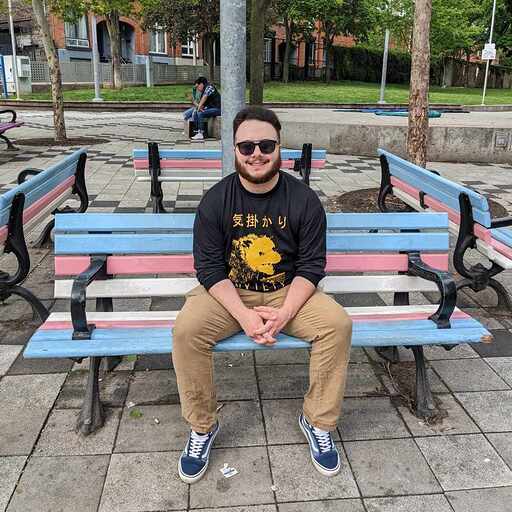
Pop-Up Pride in the Park at Broadway Park, located on the reservation of the Saginaw Chippewa Indian Tribe of Michigan, in Mount Pleasant.
As Michigan’s government continues to pass laws protecting the rights of LGBTQ+ people, rural residents are finding ways to build more inclusive communities.
Growing up in Shepherd, a village on the outskirts of Mount Pleasant, Ebay Merlin struggled to find other people in the area who also identified as part of the LGBTQ+ community.
“It’s really hard to find larger groups of transgender and queer people to connect with,” said Merlin. After high school, however, Merlin made those quality connections as a student at Central Michigan University through CMU’s pride center—a safe space that offers a variety of programs, training, and events for LGBTQ+ students and faculty.
“There were probably about 20 of us in the room, and I went in there not really expecting anything profound,” said Merlin, recalling one of the first events they attended. “I’d already been out for multiple years before that, but I went into this group and I was able to connect with them, feel comfortable with them, and be seen by them in a way that I didn’t even know that I was missing.”
That feeling of belonging led Merlin to look for ways to build community among other rural LGBTQ+ people in Michigan. When the Mount Pleasant Pride Center opened in the fall of 2023, they saw an opportunity to offer neighbors what they had been missing for so many years. Today, Merlin is the center’s volunteer coordinator.
“I think that putting on Pride events and having pride centers is one of those ways that we can get more people involved in their community and more involved in their community politics,” they said.
For Pride this year, the Mount Pleasant Pride Center teamed up with Mount Pleasant Counseling Services and Great Lakes Bay Pride to host Pop-Up Pride in the Park, an event for people throughout the region to gather and enjoy local food and vendors at Broadway Park, located on the reservation of the Saginaw Chippewa Indian Tribe of Michigan.
Hundreds of people showed up.
“When I saw all these people coming, I realized they’re all coming from this area because they needed [this event], too,” said Lacey Mandoka, a local member of the tribe.
“It fills my cup. It makes me happy because there are allies here and there are people here who are LGBTQ+ and two-spirit, and they’re in a safe environment—and it fills my cup,” said Mandoka.
Events like these don’t just build community—they can be lifesaving.
While LGBTQ+ youth are not inherently prone to higher suicide risk because of their sexual orientation or identity, they are placed at a higher risk because of how they are mistreated and stigmatized in society. New reports from The Trevor Project revealed that 39% of LGBTQ+ young people between the ages of 13 and 24 seriously considered suicide last year—including 46% of transgender and nonbinary youth.
However, the study also revealed that when they do have access to affirming spaces and communities, LGBTQ+ youth report lower rates of attempting suicide.
The statistics are particularly alarming for kids in rural areas and small towns. About half of LGBTQ+ youths from rural areas reported that their community was not accepting of LGBTQ+ people, compared to about a quarter of LGBTQ+ youths in urban and suburban areas. And when it comes to discrimination and physical harm, the trend holds—rural LGBTQ+ youths experience both at higher rates than their peers in urban and suburban areas.
Who’s standing with rural LGBTQ+ kids in Michigan?
While Gov. Gretchen Whitmer has passed several pieces of legislation proposed by Democratic lawmakers to ensure Michigan is a safe state for LGBTQ+ residents, Merlin said the onslaught of anti-LGBTQ+ bills popping up around the country—and even those still being proposed by Republicans in Michigan—are making them feel uneasy.
“Maybe Michigan is okay right now, but Whitmer isn’t going to be governor forever. She can’t protect us forever. None of us are going to be safe if we are complacent about it.”
One of Whitmer’s efforts to build representation in Michigan’s leadership that lasts beyond her term is the state’s LGBTQ+ Commission. It’s an advisory force composed of 15 Michiganders with diverse experiences within the LGBTQ+ community, who act as a bridge between communities and the state government.
In an interview with The ‘Gander, the chair of that commission, Raul Hernández-Guzmán, said LGBTQ+ communities have increasingly become targets for attacks across the country.
“It’s important to stick together to create a community that’s welcoming and supportive of each other,” Hernández-Guzmán said, “and for people that are outside of our community to be allies to really support us and our fight for equality in Michigan.”
Support Our Cause
Thank you for taking the time to read our work. Before you go, we hope you'll consider supporting our values-driven journalism, which has always strived to make clear what's really at stake for Michiganders and our future.
Since day one, our goal here at The 'Gander has always been to empower people across the state with fact-based news and information. We believe that when people are armed with knowledge about what's happening in their local, state, and federal governments—including who is working on their behalf and who is actively trying to block efforts aimed at improving the daily lives of Michigan families—they will be inspired to become civically engaged.


Federal judge denies request to ax Michigan’s ban on conversion therapy
BY ANNA LIZ NICHOLS, MICHIGAN ADVANCE MICHIGAN—A federal judge has rejected a request in a lawsuit to halt Michigan’s new law banning conversion...

Trans Unity rally brings hundreds to Michigan Capitol
BY JON KING, MICHIGAN ADVANCE Targeted by President Donald Trump from his first day in office, trans individuals, allies and their loved ones...

Expert says LGBTQ+ suicide prevention should take a broader approach
BY JON KING, MICHIGAN ADVANCE MICHIGAN—Providing resources to assist LGBTQ+ youth before they reach a crisis point was the key message made during a...

Advocates say Trump executive order targeting trans people is ‘permission to hate’
BY JON KING, MICHIGAN ADVANCE MICHIGAN—Both the ACLU and Lambda Legal laid out their plans this week to vigorously oppose an executive order by...

Shop small, not small-minded: Over 30 local LGBTQ+-owned businesses to support in Michigan
These LGBTQ+ Michiganders are creating community and investing in their neighborhoods—here’s how you can support them. Supporting the LGBTQ+...







